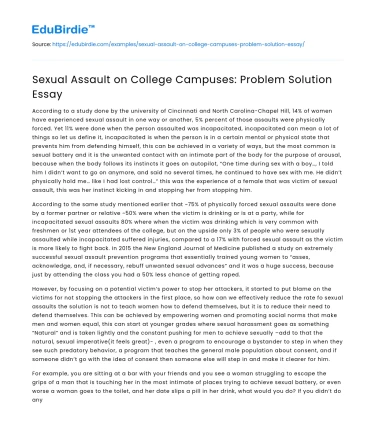According to a study done by the university of Cincinnati and North Carolina-Chapel Hill, 14% of women have experienced sexual assault in one way or another, 5% percent of those assaults were physically forced. Yet 11% were done when the person assaulted was incapacitated, incapacitated can mean a lot of things so let us define it, incapacitated is when the person is in a certain mental or physical state that prevents him from defending himself, this can be achieved in a variety of ways, but the most common is sexual battery and it is the unwanted contact with an intimate part of the body for the purpose of arousal, because when the body follows its instincts it goes on autopilot, “One time during sex with a boy…, I told him I didn’t want to go on anymore, and said no several times, he continued to have sex with me. He didn’t physically hold me… like I had lost control…” this was the experience of a female that was victim of sexual assault, this was her instinct kicking in and stopping her from stopping him.
According to the same study mentioned earlier that ~75% of physically forced sexual assaults were done by a former partner or relative ~50% were when the victim is drinking or is at a party, while for incapacitated sexual assaults 80% where when the victim was drinking which is very common with freshmen or 1st year attendees of the college, but on the upside only 3% of people who were sexually assaulted while incapacitated suffered injuries, compared to a 17% with forced sexual assault as the victim is more likely to fight back. In 2015 the New England Journal of Medicine published a study on extremely successful sexual assault prevention programs that essentially trained young women to “asses, acknowledge, and, if necessary, rebuff unwanted sexual advances” and it was a huge success, because just by attending the class you had a 50% less chance of getting raped.
Save your time!
We can take care of your essay
- Proper editing and formatting
- Free revision, title page, and bibliography
- Flexible prices and money-back guarantee
However, by focusing on a potential victim’s power to stop her attackers, it started to put blame on the victims for not stopping the attackers in the first place, so how can we effectively reduce the rate fo sexual assaults the solution is not to teach women how to defend themselves, but it is to reduce their need to defend themselves. This can be achieved by empowering women and promoting social norms that make men and women equal, this can start at younger grades where sexual harassment goes as something “Natural” and is taken lightly and the constant pushing for men to achieve sexually –add to that the natural, sexual imperative(it feels great)- , even a program to encourage a bystander to step in when they see such predatory behavior, a program that teaches the general male population about consent, and if someone didn’t go with the idea of consent then someone else will step in and make it clearer for him.
For example, you are sitting at a bar with your friends and you see a woman struggling to escape the grips of a man that is touching her in the most intimate of places trying to achieve sexual battery, or even worse a woman goes to the toilet, and her date slips a pill in her drink, what would you do? If you didn’t do anything but have this program in your university there will be dozens of people willing to step in and fix the situation before it gets even dirtier, but what if you saw what was happening and your university did not have this program, would you or anyone step in, and help a fellow friend or stranger? Or will you blame it on the woman in the first place for letting herself reach this situation? Or should we blame it on our society for pressuring men to “Score” and ignoring sexual harassment at a younger age?






 Stuck on your essay?
Stuck on your essay?

